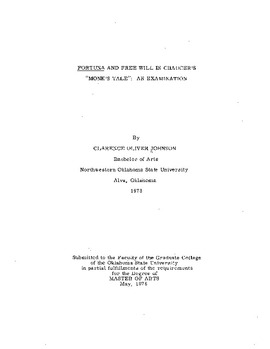| dc.contributor.advisor | Luecke, Janemarie | |
| dc.contributor.author | Johnson, Clarence Oliver | |
| dc.date.accessioned | 2015-10-14T21:37:20Z | |
| dc.date.available | 2015-10-14T21:37:20Z | |
| dc.date.issued | 1976-05-01 | |
| dc.identifier.uri | https://hdl.handle.net/11244/19594 | |
| dc.description.abstract | In this paper I advance the thesis that the portrayal of Fortuna, in the "Monk's Tale," is developed so that an orderly progression from a totally pagan Fortuna to a Christian conception of the goddess to the exclusion of the goddess' existence may be discerned. The idea of an ordering of the conceptions of Fortuna is not new. However, the idea of a progression such as I suggest is new and, futhermore, I have not found any work which suggests the possibility that the tragedie of Croesus is an example of the replacement of Fortuna with the concepts of free will and Divine providence. My analysis of the progression and the explication of the tragedie of Croesus will show that this progressive development of Fortuna and the introduction of free will in Croesus has a unifying effect on the "Monk's Tale" and thereby disallows the criticism of the tale on the grounds of disunity and poor workmanship. | |
| dc.format | application/pdf | |
| dc.language | en_US | |
| dc.publisher | Oklahoma State University | |
| dc.rights | Copyright is held by the author who has granted the Oklahoma State University Library the non-exclusive right to share this material in its institutional repository. Contact Digital Library Services at lib-dls@okstate.edu or 405-744-9161 for the permission policy on the use, reproduction or distribution of this material. | |
| dc.title | Fortuna and Free Will in Chaucer's "Monk's Tale": An Examination | |
| dc.type | text | |
| dc.contributor.committeeMember | Rulroy, Wilham | |
| dc.contributor.committeeMember | Berkeley, David S. | |
| osu.filename | Thesis-1976-J66f.pdf | |
| osu.accesstype | Open Access | |
| dc.description.department | English | |
| dc.type.genre | Thesis | |
